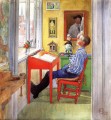Paintings > Art styles > Arts and Crafts Movement
 The Arts and Crafts Movement was an international design movement that flourished between 1860 and 1910, especially in the second half of that period, continuing its influence until the 1930s. It was led by the artist and writer William Morris (1834–1896) during the 1860s,[1] and was inspired by the writings of John Ruskin (1819–1900) and Augustus Pugin (1812–1852), although the term "Arts and Crafts" was not coined until 1887, when it was first used by T. J. Cobden-Sanderson at a preliminary meeting of the Arts and Crafts Exhibition Society.
The Arts and Crafts Movement was an international design movement that flourished between 1860 and 1910, especially in the second half of that period, continuing its influence until the 1930s. It was led by the artist and writer William Morris (1834–1896) during the 1860s,[1] and was inspired by the writings of John Ruskin (1819–1900) and Augustus Pugin (1812–1852), although the term "Arts and Crafts" was not coined until 1887, when it was first used by T. J. Cobden-Sanderson at a preliminary meeting of the Arts and Crafts Exhibition Society.The movement developed first and most fully in the British Isles, but spread across the British Empire and to the rest of Europe and North America. It was largely a reaction against the perceived impoverished state of the decorative arts at the time and the conditions in which they were produced. It stood for traditional craftsmanship using simple forms and often applied medieval, romantic or folk styles of decoration. It advocated economic and social reform and has been said to be essentially anti-industrial.





